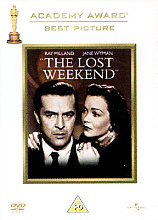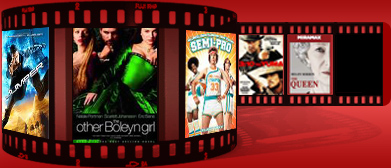Free Membership
Welcome to DVD-Movie-Sale.co.uk!
DVD Movie Sale is a comprehensive DVD site where you can search for any movie by genre, film title, actors name or director. Complete with full film information & synopsis as well as being able to compare prices for your favourite DVD from leading retail stores. You even have the opportunity to include your personal film reviews or give your personal ratings with numerous chances to win dvd related prizes.
Browse DVDs
Lost Weekend, The
Lost Weekend, The
 Stars: Ray Milland, Jane Wyman, Phillip Terry, Howard Da Silva, Doris Dowling
Stars: Ray Milland, Jane Wyman, Phillip Terry, Howard Da Silva, Doris DowlingDirector: Billy Wilder
Summary: Ray Milland stars as alcoholic writer Don Birnam in Billy Wilder's first unabashedly dramatic film, and one of the first to deal in such painstaking detail with the disease of alcoholism. Don shares an apartment in New York City in the 1940s with his brother Wick (Phillip Terry) who has his hands full trying to deal with his brother's drinking problem. One night, Don encourages his brother to take his girlfriend Helen St. James (Jane Wyman) to hear some music only so that he can be out from under their watchful eyes. Taking the money left for the maid, he goes out to buy some liquor, stashing one bottle in the chandelier. When he goes to the bar the next day, Nat (Howard Da Silva), the owner berates him for treating his girlfriend badly and warns him that he's on a path toward death. Don returns to the apartment to try to work on his novel 'The Bottle' but consumed by self-doubt, goes to another bar, and steals a woman's purse to buy a drink. As the weekend wears on, his spiral downward continues apace. Although dated in some respects, the film's unadorned portrait of the relentless torture that is alcoholism still packs a powerful punch thanks to Wilder's sharp script, the deep-focus camerawork of John Seitz, and a career performance by Ray Milland.

WIN DVDS by being amongst the first to review this DVD. Reviewing DVDs earns you bonus entries and lets you WIN DVDs!Please login before reviewing this DVD. If you're a new user, register for free and enter to WIN FREE DVDs!

 "I'm not a drinker--I'm a drunk." These words, and the serious message behind them, were still potent enough in 1945 to shock audiences flocking to The Lost Weekend. The speaker is Don Birnam (Ray Milland), a handsome, talented, articulate alcoholic. The writing team of producer Charles Brackett and director Billy Wilder pull no punches in their depiction of Birnam's massive weekend bender, a tailspin that finds him reeling from his favorite watering hole to Bellevue Hospital. Location shooting in New York helps the street-level atmosphere, especially a sequence in which Birnam, a budding writer, tries to hock his typewriter for booze money. He desperately staggers past shuttered storefronts--it's Yom Kippur, and the pawnshops are closed. Milland, previously known as a lightweight leading man (he'd starred in Wilder's hilarious The Major and the Minor three years earlier), burrows convincingly under the skin of the character, whether waxing poetic about the escape of drinking or screaming his lungs out in the D.T.'s sequence. Wilder, having just made the ultra-noir Double Indemnity, brought a new kind of frankness and darkness to Hollywood's treatment of a social problem. At first the film may have seemed too bold; Paramount Pictures nearly killed the release of the picture after it tested poorly with preview audiences. But once in release, The Lost Weekend became a substantial hit, and won four Oscars: for picture, director, screenplay, and actor. --Robert Horton
"I'm not a drinker--I'm a drunk." These words, and the serious message behind them, were still potent enough in 1945 to shock audiences flocking to The Lost Weekend. The speaker is Don Birnam (Ray Milland), a handsome, talented, articulate alcoholic. The writing team of producer Charles Brackett and director Billy Wilder pull no punches in their depiction of Birnam's massive weekend bender, a tailspin that finds him reeling from his favorite watering hole to Bellevue Hospital. Location shooting in New York helps the street-level atmosphere, especially a sequence in which Birnam, a budding writer, tries to hock his typewriter for booze money. He desperately staggers past shuttered storefronts--it's Yom Kippur, and the pawnshops are closed. Milland, previously known as a lightweight leading man (he'd starred in Wilder's hilarious The Major and the Minor three years earlier), burrows convincingly under the skin of the character, whether waxing poetic about the escape of drinking or screaming his lungs out in the D.T.'s sequence. Wilder, having just made the ultra-noir Double Indemnity, brought a new kind of frankness and darkness to Hollywood's treatment of a social problem. At first the film may have seemed too bold; Paramount Pictures nearly killed the release of the picture after it tested poorly with preview audiences. But once in release, The Lost Weekend became a substantial hit, and won four Oscars: for picture, director, screenplay, and actor. --Robert Horton























